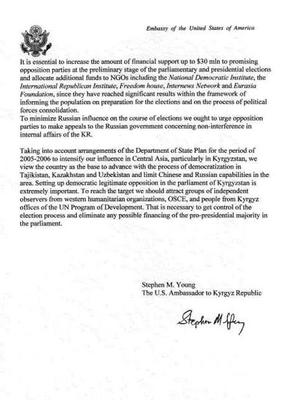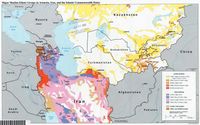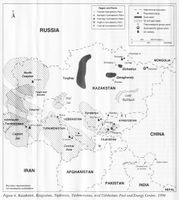US involvement in the revolution.. a rant by Chris
If, as Akayev claims, he was a stalwart preventing the spread of Islamic extremism the US would not remove him. I mean just read about Mobutu in Zaire and you will realize the US will hemorrhage itself of billions and billions of dollars to put and keep dictators in power who act as "stabilizing forces."
I think what happened is that the Embassy was encouraging the opposition groups and trying to prevent Russian influence because it actually WANTED DEMOCRACY to happen in Kyrgyzstan WITHOUT INFLUCEN FROM OUTSIDE! The US only has MANAS, a glorified tent-camp, there is no natural resource or any other stratigic motivator in Kyrtgyzstan! I mean look at the organizations Akayev fingered, NDI and Freedom House.. HAS HE ANY IDEA WHAT THESE GROUPS DO??? The whole purpose of these groups is to bring democracy through transparent change in policy and they have done it in places much much much much worse than Kyrgyzstan... Akayev was not VERY democratic he was kind of like a peaceful dictator, I mean he was the same leader they had before Independence from Russia!! It was time for a change and the US probably wanted to help encourage that. Now this could be misinterpreted by a paranoid person to mean that the US staged the coup. But think about this, why would the US just stage half a coup? The point of an externally motivated coup is to put a specific person in power.!!!!! not just to wreck havoc and certainly not to wreck havoc in areas where extremism could take hold.
Maybe the fact that the US diplomats actually have good-will intentions for the countries they serve in is such a foriegn idea for some people that they have to create these absurd conspiracy theories. Maybe the complete lack of an obvious malevolent goal of the US in enouraging the oppostion group is enough to make it seem more probable. But usually with diplomacy it is alot more boring than you think, this was just encouragement to help Krygzstan prosper. The US must want central asia to develope so that extremism perishes (I mean look at Bahrain, they are muslim but very far from Taliban, development really helps people think better.)
I mean even if you maintain a maligned view of the US it still makes no sense, like think about robbers who go around just breaking into places without thinking about how much money might be there or how to collect the money when the get in or how to make an escape... I mean you have to plan twice as hard if you are going to be a successful malevolent force, you don't just "encourage revolutions" willy nilly. However, if you are simply interested in people taking decisions into their own hands and becoming a true democracy I think what happened in the revolution is EXACTLY what you would want. The Kyrgyz people should be kind of proud how they stood up against corruption, that takes some bravery, especially when there was no effective rule of law. If this same thing happened in Africa it would have been a bloodshed followed by a famine.
Speaking of, I am really surprised that Hizb ut-tahrir did not try and stage anything over the last few months, I mean they had a good chance during the revolution and another after th Uzbek massacre (which they were "implicated" in by the questionable Uzbek authorities). I am really interested in this group and I am kind of surprised that such a well organized effort has been stymied by some threats of imprisonment. Maybe the kyrgyz prison system is worse than I imagined.
Ok well here is a supposed letter from the US amb in kg.. I have no idea if it is real or not, but it has been floating around the web, I think it came from the Kyrgyz News Agency.

and here is something off of an untra-libral blog ...
http://www.edstrong.blog-city.com/kyrgyzstan_revolution_americas_fingerprints_all_over_it.htm
Secret report of the U.S. Ambassador to Kyrgyz Republic Stephen M.YoungBishkek, Kirghiz Republic
December 30, 2004Pre-election situation report
Analysis of the social and political situation in Kyrgyzstan testifies the growing instability on the threshold of parliamentary elections in the country.
Against the background of economic crisis, accompanied with national impoverishment, corruption in state bodies and outflow of labor force abroad, some other external factors have a strong impact upon the political forces arrangement, i.e. influence (besides our geopolitical interests) of Russia, China, Uzbekistan, Kazakhstan and to a lesser extent of the EU countries and radical Islamic ideas proliferated from Iran.
The results of public opinion polls in Kyrgyzstan, conducted by the US Embassy in cooperation with USAID, NDI, IRI, other international organizations including Freedom House, Internews Network, Soros Foundations and the Eurasia Foundation in view of the above-mentioned countries influence on the politically active population, allow us to draw a conclusion that at present none of the states has prevailing influence.
The only exception is Russia, which counts considerably in Kyrgyzstan, as it has retained multiform connections with the republic. Akaev, being a protegee of Russia, is guided by Moscow. However, we have not got the facts of Russian financing any candidates or parties.
As regards China, the prospect of Central Asia development puts Beijing into dependence on the Kyrghyz hydro-electric resources and electric power potential.
Thus Kyrgyzstan foreign policy is aimed at trade and economic expansion that coincides with Chinese further plans, in particular those concerning electric power and water distribution.
This reason should be taken into consideration when shaping a policy towards Beijing and its presence in the region.
Our military presence in Kyrgyzstan “is annoying” Beijing, and the temporary status of the air force base at Manas airport in Bishkek gives grounds to China to hope for would- be withdrawal of the US troops from Kyrgyzstan.
In this regard, we are sure to expect counteracting steps of the Chinese government against our military expansion in the region. At present China renders informal support to the politicians disposed to further development of relations with Beijing and restriction of our military contingent in Kyrgyzstan.
In addition, Akaev’s assistance in the struggle against Uigur separatism and religious extremism is obviously insufficient.
In view of the acts of terrorism committed against the US offices last summer in Uzbekistan and the Department of State and our secret services information on further plans of terrorists against the US Embassy in Kyrgyzstan, we are facing the real menace constituted by political actrocities of the religious extremist party Hizbut Tahrir and its radical Islamic ideas, which exert negative influence upon the formation of pre-election situation in the state.
According to the firsthand information, the radicalism has been actively promoted by Iran, Uzbekistan and Saudi Arabia. The activities of Islamists are set to construct mosques, establish religious educational institutions, arrange pilgrimage, and organize training of Kyrgyz religious leaders in Muslim countries.
At present there are about 30 Muslim organizations and societies operating in Kyrgyzstan. Among them the greatest activity is shown by the office of the international charitable organization Al- Vakf al Isiami. Its leader Muntasir Abu Hasan has friendly relations with Akaev and Sabirov, Kyrgyz MPs, clerical leaders . A.Narmatov, M.Magomedov, O.Chotonov.
We have elicited facts about contacts of the party leadership with representatives of the Chechen Diaspora. According to our analysts, Sabirov and Tursunbay Bakir uulu, leader of Erkin Kyrgyzstan, will take advantage of Muslim organizations support at the forthcoming elections.
They are keeping in touch with hard liners from HizbutTtahrir to legitimate the party in Kyrgyzstan. On trips to southern areas of Kyrgyzstan some of the embassy staff have found out information on dissemination of leaflets issued by Hizbut Tahrir, which propagandize religious extremism and sharia laws.
Taking into account the interests, of our presence in the region and development of democratic society in Kyrgyzstan, our primary goal — according to the earlier approved plans — is to increase pressure upon Akaev to make him resign ahead of schedule after the parliamentary elections.
Realizing the plan is of key importance as, we think, the present opposition is not strong enough to challenge the present authorities, though Akaev has claimed he is not going to prolong his terms of office.
We know, Akaev’s adherents suspect the opposition to prepare the same scenario of elections like that one in Georgia and Ukraine. That was indirectly asserted by Akaev at December meeting of the Council of Defense of the KR.
In case of prolongation of presidential powers Akaev is mast likely to take advantage of the assistance rendered by the Russian-speaking part of the population and other ethnic minorities, as well as of several thousand residents who are on earnings in Russia now.
In this connection, for better planning of pre-election tactics we ought to remember that Russia remains the basic employer in Kyrgyzstan. Both the pro-Russian public opinion and popularity of the Russian president are rather strong in some northern regions of the country.
According to the materials we sent to the Department of State earlier, at present two formations are shaped on the political arena of Kyrgyzstan. They will struggle for posts in the parliament and then nominate candidates for the presidency.
First of all, it is the pre-election block For Powers of People. In July 2004 it united six opposition parties, which nominated K.Bakiev, ex-prime minister and MP, as their single candidate for the presidential post.
I think he is the most acceptable candidate in the aspect of fruitful development of relations between the USA and Kyrgyzstan. I met Bakiev on repeated occasions. Bakiev expressed his consent to take advantage of the support after his block’s winning in parliamentary elections.
As he said, after ambiguous American involvement in elections in Georgia and Ukraine unconcealed American support provided to a candidate might have a negative effect on his political reputation. Furthermore, he was against falling off in relations with Russia by criticizing on behalf of his party Russian intervening in the Ukrainian elections.
Among the other significant political leaders we name M.Ashirkulov, the former secretary of Security Council, and F.Kulov, who is currently imprisoned. They represent a newly founded party— the Civic Union For Fair Elections.
We believe Ashirkulov’s growing popularity has been arisen from recent Scandals and his demonstrative walkout from the president’s team. In our opinion, it was a specially made up action to promote the president’s friend to head up a “puppet” opposition.
In this connection, we advise continuing contacts with another prominent representative of the opposition — F.Kulov, whose imprisonment will end in the middle of 2005. Enjoying deserved popularity and being a victim of regime, he will have sufficient potential to struggle for the presidency.
F.Kulov shares and adheres to American concepts of freedom and democracy and can be viewed as a dubbing candidate for the presidency in case our main candidate Bakiev is defeated.
We have mostly succeeded in developing contacts with another leader of the opposition — R.Otunbaeva, ex-Minister for Foreign Affairs.
Through the funds allocated to her we managed to lobby setting up and promoting certain NGOs as well as organizing a unified system of mass media for better coverage over the country to spread her statement about non-interference of Russia in internal affairs of Kyrgyzstan.
With a view to providing favorable conditions and helping democratic opposition leaders come to power, our primary goal for the pre-elections period is to arouse mistrust to the authorities in force and Akaev’s incapacitated corruption regime, his pro-Russian orientation and illegal use of “an administrative resource” to rig elections.
In this regard, the embassy’s Democratic commission, Soros Foundations, Eurasia Foundation in Bishkek in cooperation with USAID have been organizing politically active groups of voters in order to inspire riots against pro-president candidates.
We have set up and opened financing for an independent printing office — the Media Support center — and AKIpress news agency to interpret impartially the course of the elections and minimize state mass media propaganda impact. We also render financial support to promising non-governmental tele- and radio companies.
According to public polls results, we can come to conclusion that only a minor part of the population— former USSR citizens — is satisfied with close cooperation with Russia. Young people are most likely oriented to the West.
Therefore we consider it extremely important to popularize American way of life among them to diminish Russian influence.
At least 45 national higher schools have their local Students in Action organizations, which we are planning to use properly during parliamentary and presidential elections.
In our opinion, those additional funds ($5m) transferred by the Department of State to hold seminars in all leading Universities of Kyrgyzstan and organize training in western countries turned out insufficient.
Conclusion
In the view of the pre-election situation and effort to provide fair and democratic elections in the KR and retain our positions in mass media and contacts with the opposition leaders, I advise focusing on discrediting the present political regime, thus making Akaev and his followers responsible for the economic crisis. We should also take steps to spread information on probable restriction of political freedoms during the election campaign.
It is worthwhile compromising Akaev personally by disseminating data in the opposition mass media on his wife’s involvement in financial frauds and bribery at designation of officials.
We also recommend spreading rumors about her probable plans to run for the presidency, etc. All these measures will help us form an image of an absolutely incapacitated president.
It is essential to increase the amount of financial support up to $30m to promising opposition parties at the preliminary stage of the parliamentary and presidential elections and allocate additional funds to NGOs.
Including the National Democratic Institute, the International Republican Institute, Freedom house, Internews Network and Eurasia Foundation, since they have reached significant results within the framework of informing the population on preparation for the election and on the process of political forces consolidation.
To minimize Russian influence on the course of elections we ought to urge opposition parties to make appeals to the Russian government concerning non-interference in internal affairs of the KR.
Taking into account arrangements of the Department of State Plan for the period of 2005-2006 to intensify our influence in Central Asia, particularly in Kyrgyzstan, we view the country as the base to advance with the process of democratization in Tajikistan, Kazakhstan and Uzbekistan and limit Chinese and Russian capabilities in the area Setting up democratic legitimate opposition in the parliament of Kyrgyzstan is extremely important.
To reach the target we should attract groups of independent observers from western humanitarian organizations, OSCE, and people from Kyrgyz offices of the UN Program of Development.
That is necessary: to get control of the election process and eliminate any possible financing of the pro-presidential majority in the parliament.
Stephen M.Young
The U.S. Ambassador to Kyrgyz Republic
posted Monday, 28 March 2005




